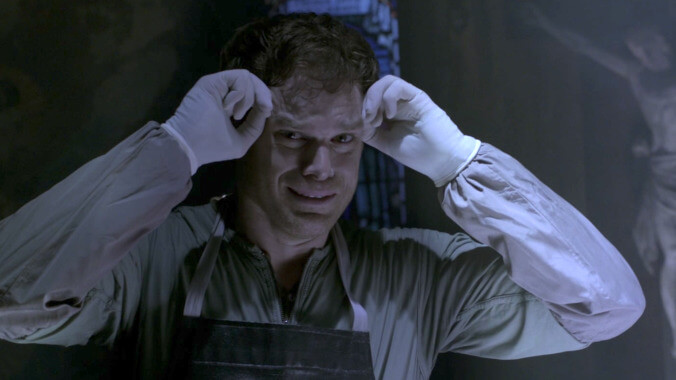They can’t all be killer: In defense of Dexter’s final seasons
There's a lot to like about the later seasons of Michael C. Hall's signature Showtime series—if you can overlook the bad


When Dexter aired its then-final episode in September 2013, a wave of scorn washed over the entire series. Ever since season six had earned the mockery of fans and critics alike with its poor handling of “The Doomsday Killers”—one of whom turned out to be a hallucination in the form of Edward James Olmos—a drumbeat of negative reactions to the once-beloved show had steadily increased. And once it was over, it was as though permission to fully turn on Dexter had been granted. Hey everyone, went the general consensus, this shit sucked.
Yet, as with any long-running form of media, the irritating contrarian voice will eventually arrive to say, “Yes, but…” In the case of Dexter, it turns out that irritating contrarian is me. I finished Dexter in 2013 with the sadness of a parent watching their once-honor roll student end up working for Glenn Beck. But when I revisited the series last year for a TV Club 10 feature highlighting the breadth of what the show represented, I found myself with a newfound appreciation for elements of those last few seasons—interesting and compelling creative babies thrown out with the conceptual bathwater.
Let’s be clear: This is no wholesale argument that the last few seasons of Dexter make up some misunderstood masterpiece, or even a misguided but feasible claim that the final years “are good, actually.” They’re rightly seen as subpar, but to take a closer look at the most maligned seasons of the series is to gain a better respect for the things it did right—especially in contrast to the many things it did wrong.
The final Dexter seasons: Still a failure of storytelling
Before looking at those strengths, it’s important to acknowledge that there was no bigger failure during Dexter’s waning days than the storytelling itself. Structurally and conceptually, seasons six through eight were a morass of inconsistent characterization, unintelligent plotting (exemplified in a police force that increasingly couldn’t seem to find its own ass, let alone bad guys), and turning disturbed narcissist Dexter Morgan into, in critic Emily VanDerWerff’s words, “your friendly neighborhood serial killer.” Even the finale refused to risk turning its audience against Dexter in even the most minor of ways. When his sister Deb dies of a gunshot wound directly due to his selfishness, she ends up apologizing to him.
It’s hard not to attribute this downturn in quality to showrunner Scott Buck, a writer since season two, who took the reins in the sixth season and oversaw the muddying of Dexter’s motivations. He reduced even the series-long arc of Dexter’s journey to becoming someone capable of love to juvenile hogwash, having Dexter abandon his own son in the final minutes with the ill-considered idiocy of a child breaking his own toy rather than letting another borrow it. (Buck has since gone on to become the epitome of the middling white guy who fails upward, disastrously showrunning Marvel’s Iron Fist, and yet somehow being handed the reins of yet another Marvel property, Inhumans, only to screw that up even worse.) The Dexter who began the series was light years smarter and more considered than the nitwit at the end.
It’s not difficult to find the bad in these later years. Hell, it’s as prevalent as the convenient repeated brushes with murderers that no one seems to notice happen to Dexter an awful lot. So let’s take a look at the things that, even in the face of a showrunner and creative team seemingly bound and determined to do them in, managed to shine.
Michael C. Hall remains excellent throughout
Even in its better early years, Dexter often felt like an A-level star performance surrounded by a B-team supporting cast. And if there’s any baling wire holding together the messy sprawl of the final seasons, it’s Michael C. Hall’s performance. He continually manages to inject plausibility and nuance into even the most ludicrous of Dexter’s behavior, making laughable dialogue moments feel soulful. Take season six’s “Get Gellar,” arguably the low-water mark for the series (at least, until the finale); during a scene of police doing their damndest to sound dumber than his toddler son, Hall retains his character’s gravitas.
Given what he’s surrounded by, that’s not nothing. Jennifer Carpenter likewise brought some depth to these later years. Since her Deb began life as a fairly one-note cartoon of profanity and hyperactive pep, it was impressive to see Carpenter invest some heft to the silliness of the show’s nadir moments.
Dexter season five gets a bad rap—as does (gasp!) seven
Look, nothing was going to match the high-water mark of season four, with John Lithgow’s Arthur Mitchell/Trinity Killer and that gut-punch ending leaving an indelible image in viewers’ minds. It was unlikely that anything coming after could measure up in the eyes of Dexter fans.
But season five seems to have become a victim of retrospective restructuring. With eight seasons—the best being the fourth—it’s simple and tidy to just divide the series in half, with the good stuff coming in front and the bad bringing up the rear. Rather than (appropriately) being lumped together with Dexter’s better years, the fifth season’s been stained with the mark of the Buck years. Which is too bad, because in nearly every way, season five is as good as season three, if not its immediate antecedent.
The pairing of Dexter Morgan and Julia Stiles’ Lumen Pierce made for compelling storytelling: Pairing him with a survivor of rape and torture—in other words, someone who actually has the best claim to “justice killing” of anyone Dexter’s ever known—allowed the series to once again delve into the intriguing moral ambiguity that later seasons more or less abandoned. Tightly plotted with excellent performances, it once again delivered the ticking-clock suspense on which the show made its bones. Plus, it was maybe the last time a season of Dexter drilled down on an ongoing arc without forgetting to make individual episodes pop on their own.
And season seven—coming smack dab between the two worst seasons of the series—may have sputtered out into a milquetoast villain and a bad rewriting of the character’s motivations, but the first half of it was absolutely crackerjack television. It’s very much up for debate whether a show fumbling the landing effectively negates the good that came before, but a TV series isn’t a movie. The overall whole still has stand-alone component parts. And the early parts of seven are solid. Admittedly, that’s partially thanks to one major reason…
Dexter’s final major guest stars were among the series’ best
Ray Stevenson was an absolute behemoth on season seven of Dexter. In a just world, he’d be ranked up there alongside Lithgow and Jimmy Smits as the show’s best antagonists. Unfortunately, two things ended up working against his magnetic portrayal of Isaak Sirko, the Ukrainian mob boss whose intensely personal reason for wanting to see Dexter Morgan suffer ended up costing him everything. First, as mentioned above, the season spun out into stupidity, casting a negative pall over the strong beginning, including most of Stevenson’s best work. And second, the show made the inexplicable move of swapping out Stevenson’s Isaak for the generic and unengaging “Phantom Arsonist” storyline. After his death in episode nine, there was no compelling villain left.
Similarly, Charlotte Rampling came on board for the final season and brought a wonderfully new angle to the long-running “psychology of Dexter” element to the show. Unlike Dexter’s increasingly wheezy and obvious discussions with Ghost Dad (a.k.a. his dead father, played by James Remar), Dr. Evelyn Vogel was actually an outside observer who brought fresh eyes and ideas to the question of Dexter’s need to kill. And along with that infusion of new character-study potency came Rampling’s performance. It’s redundant to say that the English actor is good at her job, but still, she brings a gravitas and weight to her scenes that elevate the material.
And despite the general antipathy toward her character, I’d be remiss to not acknowledge that Yvonne Strahovski was actually quite good as Hannah McKay. The show may have treated her character poorly, but she had undeniable chemistry with Hall, and the two made even the more lackluster scenes pop with their exchanges.
Batista’s restaurant on Dexter was Michelin starred
Okay, I made this last one up. But his restaurant never failed to make me laugh.
One of the things that makes TV criticism so pleasurable is the manner in which seasons allow you to break down the elements of a show in so many different ways, from episodic pacing to “stand-alone vs. season-long” arcs to how a show stages act breaks. So while Dexter’s ending remains the gold standard for “shitting the bed,” it shouldn’t bar us from appreciating everything that still worked about the series, long after the creative team seemed bound and determined to drive it off a cliff. Great performances, standout episodes, killer guest stars (and killed guest stars)… all of these were the reasons many of us kept coming back, even after Dexter’s narrative did its best to ensure we wouldn’t.